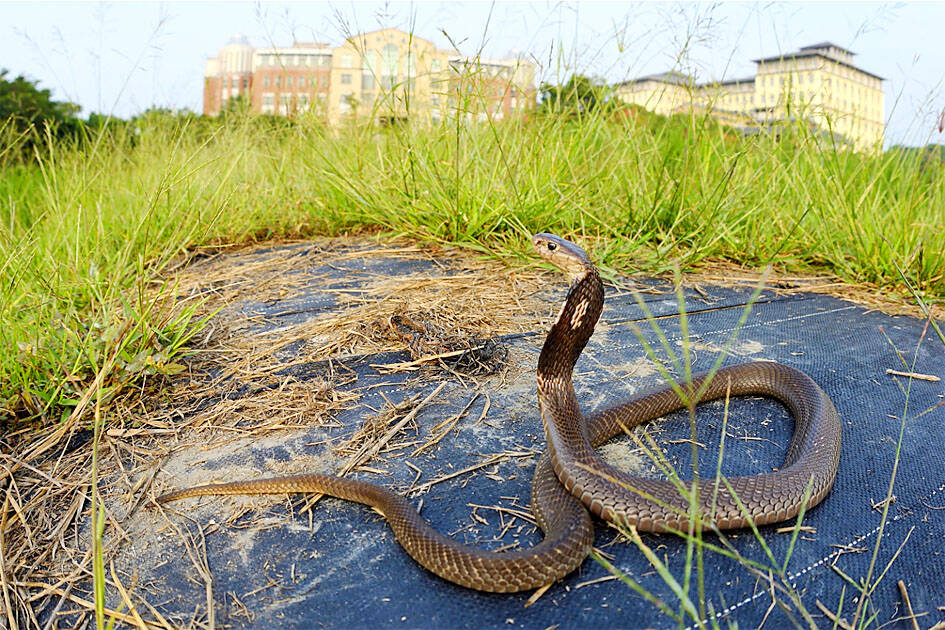More than 100 venomous snakes were captured in Tainan in April and last month amid the Taiwan cobra (Naja atra) mating season, the city’s Agriculture Bureau said.
Snake expert Cheng Kun-yen (鄭琨諺) was called in to capture a cobra that had entered an auto repair shop near Tainan City Councilor Kuo Hsin-liang’s (郭信良) office.
It took about an hour to find the young cobra, which was about 50cm long, in the cluttered shop, Cheng said.

Photo courtesy of Hsu Wei-chieh
A total of 1,414 snakes had been caught in Tainan as of the end of last month, including 427 Taiwan stink snakes (Elaphe carinata) and 309 cobras, the bureau’s Forestry and Conservation Division said.
A total of 133 cobras were caught in April, the most of any month this year, and 118 were caught last month, the division said.
Taiwan cobras live in low-altitude areas less than 500m above sea level, often appearing on flat farmland and in forests.
They eat rodents, frogs and birds, and can grow up to 2m long. Their mating season is in late spring to early summer.
Reptile Conservation Association of Taiwan secretary-general Hsu Wei-chieh (徐偉傑) said it is hard to determine the cobra population, because the government’s policy on the snakes is not conducive to data collection.
There is no clear difference between cobra populations in northern and southern Taiwan, but there is a difference between urban and rural areas, Hsu said.
A lot of cobras live in Taipei, especially along riverside areas, and it is normal for them to appear often during their mating season, he said.
If a person encounters a cobra, they should make as few movements as possible to avoid startling it, report the sighting and monitor its movements, Hsu said.
Division head Chu Chien-ming (朱健明) said that with the hot weather, the peak season for snakes has begun.
If people see a snake in their home, they should call the bee and snake hotline at 0965-565-980, and the bureau would send professionals to capture it as soon as possible, Chu said.

The manufacture of the remaining 28 M1A2T Abrams tanks Taiwan purchased from the US has recently been completed, and they are expected to be delivered within the next one to two months, a source said yesterday. The Ministry of National Defense is arranging cargo ships to transport the tanks to Taiwan as soon as possible, said the source, who is familiar with the matter. The estimated arrival time ranges from late this month to early next month, the source said. The 28 Abrams tanks make up the third and final batch of a total of 108 tanks, valued at about NT$40.5 billion

Two Taiwanese prosecutors were questioned by Chinese security personnel at their hotel during a trip to China’s Henan Province this month, the Mainland Affairs Council (MAC) said yesterday. The officers had personal information on the prosecutors, including “when they were assigned to their posts, their work locations and job titles,” MAC Deputy Minister and spokesman Liang Wen-chieh (梁文傑) said. On top of asking about their agencies and positions, the officers also questioned the prosecutors about the Cross-Strait Joint Crime-Fighting and Judicial Mutual Assistance Agreement, a pact that serves as the framework for Taiwan-China cooperation on combating crime and providing judicial assistance, Liang

A group from the Taiwanese Designers in Australia association yesterday represented Taiwan at the Midsumma Pride March in Melbourne. The march, held in the St. Kilda suburb, is the city’s largest LGBTQIA+ parade and the flagship event of the annual Midsumma Festival. It attracted more than 45,000 spectators who supported the 400 groups and 10,000 marchers that participated this year, the association said. Taiwanese Designers said they organized a team to march for Taiwan this year, joining politicians, government agencies, professionals and community organizations in showing support for LGBTQIA+ people and diverse communities. As the first country in Asia to legalize same-sex

MOTIVES QUESTIONED The PLA considers Xi’s policies toward Taiwan to be driven by personal considerations rather than military assessment, the Epoch Times reports Chinese President Xi Jinping’s (習近平) latest purge of the Chinese People’s Liberation Army (PLA) leadership might have been prompted by the military’s opposition to plans of invading Taiwan, the Epoch Times said. The Chinese military opposes waging war against Taiwan by a large consensus, putting it at odds with Xi’s vision, the Falun Gong-affiliated daily said in a report on Thursday, citing anonymous sources with insight into the PLA’s inner workings. The opposition is not the opinion of a few generals, but a widely shared view among the PLA cadre, the Epoch Times cited them as saying. “Chinese forces know full well that